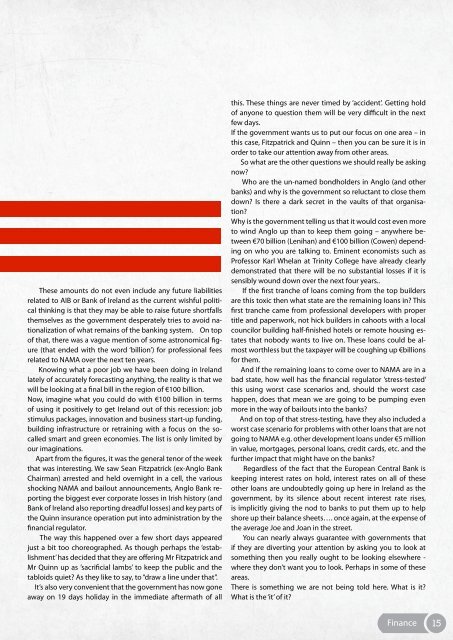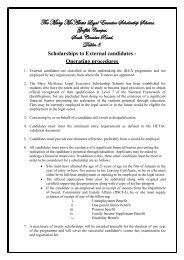Politics . News . Current Events . Music . Television . Sports
Politics . News . Current Events . Music . Television . Sports
Politics . News . Current Events . Music . Television . Sports
- No tags were found...
Create successful ePaper yourself
Turn your PDF publications into a flip-book with our unique Google optimized e-Paper software.
These amounts do not even include any future liabilitiesrelated to AIB or Bank of Ireland as the current wishful politicalthinking is that they may be able to raise future shortfallsthemselves as the government desperately tries to avoid nationalizationof what remains of the banking system. On topof that, there was a vague mention of some astronomical figure(that ended with the word ‘billion’) for professional feesrelated to NAMA over the next ten years.Knowing what a poor job we have been doing in Irelandlately of accurately forecasting anything, the reality is that wewill be looking at a final bill in the region of €100 billion.Now, imagine what you could do with €100 billion in termsof using it positively to get Ireland out of this recession: jobstimulus packages, innovation and business start-up funding,building infrastructure or retraining with a focus on the socalledsmart and green economies. The list is only limited byour imaginations.Apart from the figures, it was the general tenor of the weekthat was interesting. We saw Sean Fitzpatrick (ex-Anglo BankChairman) arrested and held overnight in a cell, the variousshocking NAMA and bailout announcements, Anglo Bank reportingthe biggest ever corporate losses in Irish history (andBank of Ireland also reporting dreadful losses) and key parts ofthe Quinn insurance operation put into administration by thefinancial regulator.The way this happened over a few short days appearedjust a bit too choreographed. As though perhaps the ‘establishment’has decided that they are offering Mr Fitzpatrick andMr Quinn up as ’sacrificial lambs’ to keep the public and thetabloids quiet? As they like to say, to “draw a line under that”.It’s also very convenient that the government has now goneaway on 19 days holiday in the immediate aftermath of allthis. These things are never timed by ‘accident’. Getting holdof anyone to question them will be very difficult in the nextfew days.If the government wants us to put our focus on one area – inthis case, Fitzpatrick and Quinn – then you can be sure it is inorder to take our attention away from other areas.So what are the other questions we should really be askingnow?Who are the un-named bondholders in Anglo (and otherbanks) and why is the government so reluctant to close themdown? Is there a dark secret in the vaults of that organisation?Why is the government telling us that it would cost even moreto wind Anglo up than to keep them going – anywhere between€70 billion (Lenihan) and €100 billion (Cowen) dependingon who you are talking to. Eminent economists such asProfessor Karl Whelan at Trinity College have already clearlydemonstrated that there will be no substantial losses if it issensibly wound down over the next four years..If the first tranche of loans coming from the top buildersare this toxic then what state are the remaining loans in? Thisfirst tranche came from professional developers with propertitle and paperwork, not hick builders in cahoots with a localcouncilor building half-finished hotels or remote housing estatesthat nobody wants to live on. These loans could be almostworthless but the taxpayer will be coughing up €billionsfor them.And if the remaining loans to come over to NAMA are in abad state, how well has the financial regulator ’stress-tested’this using worst case scenarios and, should the worst casehappen, does that mean we are going to be pumping evenmore in the way of bailouts into the banks?And on top of that stress-testing, have they also included aworst case scenario for problems with other loans that are notgoing to NAMA e.g. other development loans under €5 millionin value, mortgages, personal loans, credit cards, etc. and thefurther impact that might have on the banks?Regardless of the fact that the European Central Bank iskeeping interest rates on hold, interest rates on all of theseother loans are undoubtedly going up here in Ireland as thegovernment, by its silence about recent interest rate rises,is implicitly giving the nod to banks to put them up to helpshore up their balance sheets…. once again, at the expense ofthe average Joe and Joan in the street.You can nearly always guarantee with governments thatif they are diverting your attention by asking you to look atsomething then you really ought to be looking elsewhere -where they don’t want you to look. Perhaps in some of theseareas.There is something we are not being told here. What is it?What is the ‘it’ of it?Finance15
















